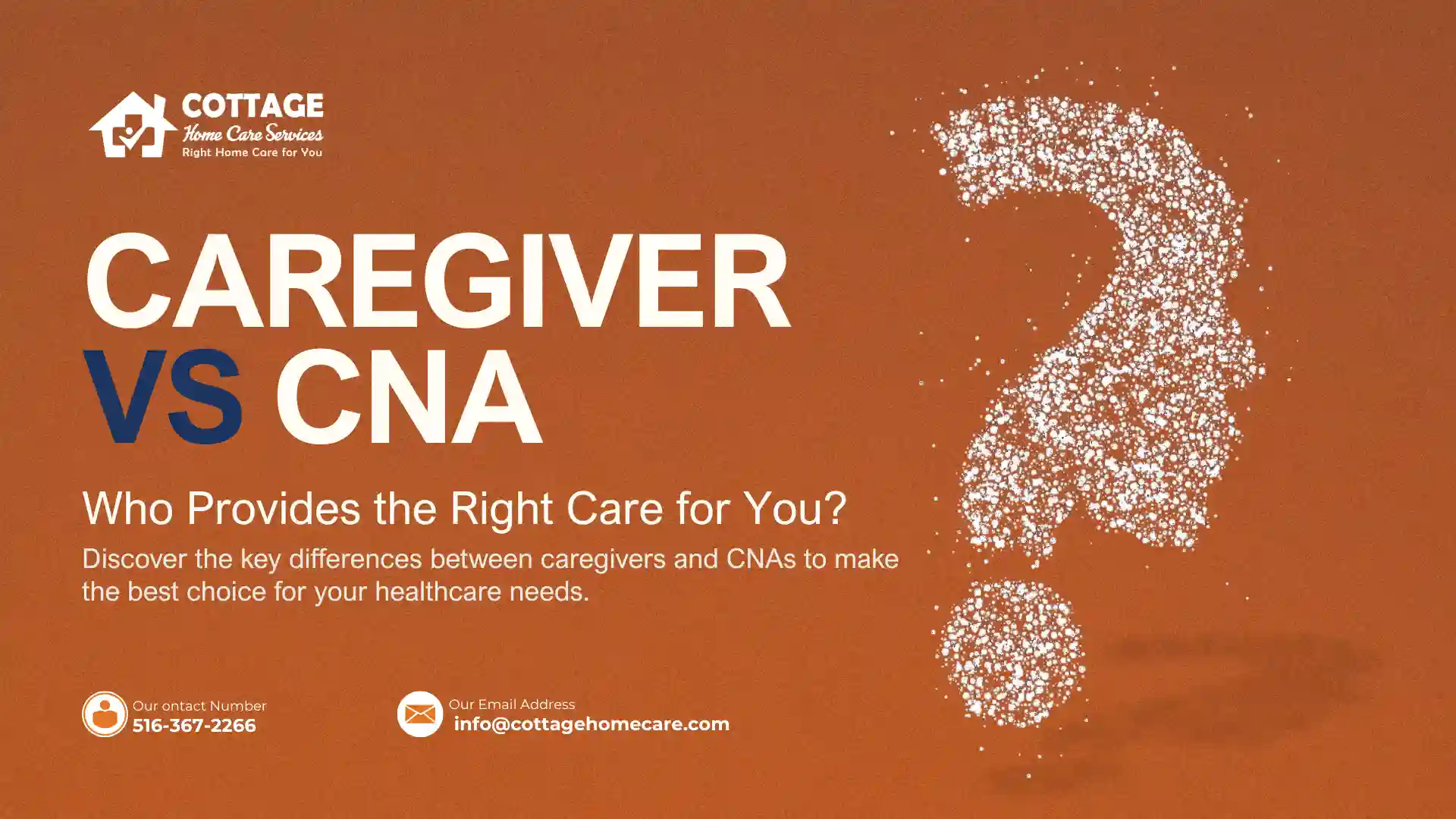
Cottage Care Blog
Caregiver vs CNA: Understanding the Key Differences
By Cottage Home Care Services
0Comment

Caregiver vs CNA: Key Differences in Training, Duties, & Settings
■ Caregivers and certified nursing assistants have different jobs and roles.
The caregiver vs. CNA debate is a common one when it comes to positions in healthcare and caring. Caregivers and Certified Nursing Assistants (CNAs) are very important for helping those who need it because they are getting older, sick, or disabled. But their training, duties, and working conditions are very different from each other. This article provides a detailed explanation of the roles of caregivers and certified nursing assistants.
■ Explain the differences between a Caregiver vs CNA.
Both caregivers and CNAs provide important services, yet their jobs are very different. Caregivers typically aid with things that don't need medical expertise or training, while CNAs do things that do.
What does it mean to be a caregiver?
A caregiver helps with everyday duties like showering, getting dressed, and making meals. They work to improve people's lives by making them feel safe, cared for, and connected. Caregivers work in homes, assisted living centres, and even hospices. They don't deliver medical care; instead, they provide companionship, reminders to take medicine, and personal care.
What does it mean to be a CNA?
A Certified Nursing Assistant (CNA) is a medical worker who does more clinical work under the supervision of a nurse or doctor. CNAs are taught to monitor vital signs, help patients move about, and sometimes undertake simple medical procedures like treating wounds. People typically hire CNAs to work in nursing homes, hospitals, and home health care settings when medical help is needed.
■ The main differences between Caregiver vs CNA
To understand the difference between a caregiver and a CNA, you need to look into several key aspects, such as training, duties, and work settings.
Training and getting certified
Most of the time, caregivers don't need any special training to start working. Some people may take specialised classes, such as those that teach about dementia or how to avoid falling, but they don't have to get certified. CNAs must first undergo a state-approved training program that involves both classroom and clinical practice. They must then pass a competency assessment. This course teaches CNAs how to provide in-person medical care.
Duties
Caregivers help with Activities of Daily Living (ADLs), which include washing, grooming, making meals, and keeping someone company. Caregivers give people who need help with things other than medical care emotional support and make sure they are secure and comfortable. But CNAs have more duties than just caring for patients. Under the supervision of healthcare experts, CNAs help with managing wounds, monitoring vital signs, and managing medical equipment.
Workplaces
Most of the time, caregivers work in private homes, assisted living facilities, and adult daycares. They help with things other than medical care, and their hours may be flexible. On the other side, CNAs work in more structured medical environments, including hospitals, nursing homes, and continuing care retirement communities, where their main job is to give medical care.
■ Things That Caregivers and CNAs Have in Common
Even though they are different, caregivers and CNAs share several similarities. Both vocations require kindness, patience, and a deep desire to help others. Both types of professionals aid people with their daily lives, but CNAs are trained to give medical care. Also, both caregivers and CNAs make their customers' or patients' lives better by being there for them or helping them with their health issues.
■ Deciding between a CNA and a caregiver.
You should hire a caregiver or a licensed nursing assistant based on the level of care required. A caregiver is the best choice for someone who needs help with daily tasks and companionship. A CNA would be a better choice if the person needs medical supervision or assistance with medical tasks like monitoring their vital signs or managing their wounds.
Think about how much care is needed.
A caretaker can help someone who requires help with personal care, daily activities, or companionship. A CNA is necessary for medical tasks such as checking vital signs, delivering prescriptions, and caring for wounds.
Look at the Setting
The work atmosphere is another thing to think about. Caregivers are helpful for people who need help around the house or in assisted living facilities that don't require medical assistance. On the other hand, CNAs are more suited for medical settings like hospitals and nursing homes, where patients need more expert care.
■ What is the difference between a Caregiver vs CNA?
The main differences between a Caregiver vs CNA are the level of training required, the tasks they do, and the places they work. Caregivers give people emotional and personal support, whereas CNAs are trained professionals who help with medical procedures and clinical tasks under the watchful eye of a nurse or doctor.
■ What a Caregiver and a Certified Nursing Assistant Do
Caregiver
Helping clients with daily tasks, such as washing, eating, and dressing, is a primary responsibility of caregivers. Caregivers also keep people company to help them feel less lonely, assist with household chores, and remind them to take their medications.
CNA
A CNA does more medical work. They assist in keeping track of important indications like blood pressure, temperature, and pulse. CNAs also help people move about and eat, and depending on the laws in their state, they may have to deliver some medications and care for wounds.
■ Caregivers vs. CNAs: What You Need to Know
Most caregivers have a high school diploma or something similar, and they may have had further training, but they don't have to have gone to school or gotten a certificate. To get certified, CNAs have to undergo a state-approved training program that includes both classroom learning and hands-on experience in a clinical setting. They also have to pass a competency exam.
■ Job Openings for Caregivers and Certified Nursing Assistants
Caregivers and CNAs both have a lot of job options, but the places they work are different. Caregivers can work in private homes, assisted living facilities, and hospices, whereas CNAs are more likely to work in nursing homes, hospitals, and other healthcare settings.
■ What to Expect in Your Career: Caregivers vs. CNAs
The Bureau of Labour Statistics says that the need for caretakers will rise by 21% between 2023 and 2033. This is much quicker than usual because more people are aging and want to receive care at home. On the other hand, the number of CNAs working is expected to grow by about 4% as they hire new people to replace those who leave the field.
■ What is the job of a caregiver?
A caregiver helps with basic personal care tasks like bathing, grooming, and making meals. They keep their clients company so they don't feel alone or lonely. Caregivers also help clients remember to take their meds when they are supposed to.
■ What does a caregiver not do?
Caregivers are not allowed to undertake medical tasks like giving out drugs or taking vital signs. These are the duties of a licensed nursing assistant or another qualified healthcare professional.
■ What you need to do to become a caregiver
There are no set requirements for being a caregiver, although it is recommended that you have a high school diploma and training in areas like dementia care or fall prevention. Caregivers should also be kind, understanding, and patient.
■ Why Should You Choose Cottage Home Care Services?
Anyone who needs non-medical help can get reliable, loving, and devoted services from Cottage Home Care Services. We make sure that our clients receive the highest level of care possible, whether it's through companionship, personal care, or reminders to take their medicine.
You may get more information about HHA certification by going to the Brooklyn Institute of Vocational Training or calling them at (929) 386-0092. Read the to learn more about the differences between a CNA and a PCA.
Recent Posts
Categories
Related Topic
caregiver vs CNACNA vs caregivercaregiver rolesCNA dutiesCNA trainingcaregiver trainingcertified nursing assistantCNA responsibilitiescaregiver vs CNA comparisonCNA work settingscaregiver dutiesCNA certificationCNA jobscaregiver supporthealthcare professionals
0comments
COMMENT SECTION
